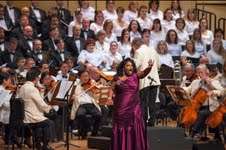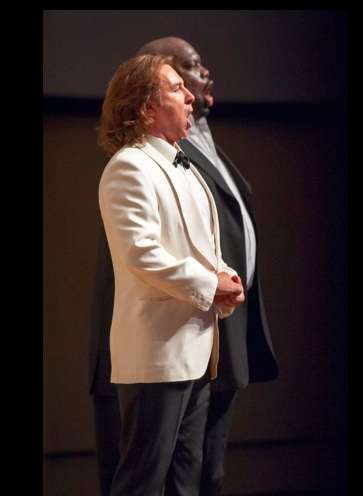|
Back
Aida Without Elephants at Ravinia Chicago
Ravinia Festival
08/03/2013 -
Giuseppe Verdi: Aida
Latonia Moore (Aida), Roberto Alagna (Radamès), Michelle DeYoung (Amneris), Morris Robinson (Ramfis), James Creswell (The King of Egypt), Mark Delavan (Amonasro), Joshua Guerrero (The Messenger), Sara Murphy (Voice of the High Priestess)
Chicago Symphony Chorus, Duain Wolfe (Director), Chicago Symphony Orchestra, James Conlon (Conductor)

(© Patrick Gipson/Courtesy the Ravinia Festival)
The concert staging of Aida at Ravinia, with James Conlon at the helm, answers the critical question: Can Aida thrill, chill, bring tears to your eyes and make your heart beat faster without elephants? The answer is a resounding yes.
James Conlon is the perfect conductor to realize all the treats Verdi wrote. While he clearly does not channel Verdi like some conductors, he is a complete master of the of Verdian dramas, motives, and the musical preparation and underscoring of the story.
Great composers do the plot lines and character development of their work. Wagner obviously did, but Puccini liberally altered what David Belasco wrote, enhancing the playwright’s story arc and characters to better suit the needs of his musical drama. In Verdi’s letters, over and over again, he writes to his librettists telling them the exact beat and color the words must fit.
Aida is an opera that stands out as a tribute to the method. Nagging plot inconsistencies are not noticeable after the first bars of Aida’s theme rise in the Prelude to the opera’s concluding notes in a tomb, with Amneris echoing outside.
On a beautiful night a Ravinia, packed to the gills in the shed and on the surrounding lawns, Verdi swept us away.

(© Patrick Gipson/Courtesy the Ravinia Festival)
Familiar singers included Roberto Alagna as Radamès, making his Ravinia debut. Alagna is a sensitive soul and this role, which he has fairly recently added to his repertoire, has taken time to settle in. Alagna’s beautiful tenor rang out from the start in “Celeste Aida.” While he seemed a bit uncomfortable being torn between two strong princesses, Aida of Ethiopia and Amneris of Egypt, once he acceded to his desire for the ‘servant’ he soared.
Michelle DeYoung is a big mezzo with all the vocal goods for Amneris. In her duets with Aida, the two voices blended with great ease and also in delicious contrast.
Morris Robinson as Ramfis takes a step forward in what promises to be a big bass career. A big bass he certainly is, using his huge rectangular chest as a sounding box to produce a distinctive tone, in some ways as distinctive as Eva Powdles. In past performances at the LA Opera and in Cincinnati, he has sometimes had trouble with dramatic presentation, but on stage at Ravinia, where all the singers displayed the emotional complexities of the opera, he stood tall and engaged fully.
Mark Delavan has been a Wotan of choice in this bi-centennial year of both Verdi’s and Wagner’s births. Stepping up to the role of Amonasro, he warmed to a touching but regal rendition of the beaten warrior. In suggesting that his daughter can help the Ethiopian cause by revealing her lover’s plans, he creates a classic father-daughter conundrum.
James Creswell was magisterial in the role of The King of Egypt. Sara Murphy, who had given a sensational performance in Britten’s Phaedra the week before, stood out from the chorus as the Voice of the High Priestess.
Conlon is known to love singers. He nurtures them. He picks and delivers, in part because they have his support and guidance.
Latonia Moore, who caused a sensation at the Metropolitan Opera when she stepped in for an ailing Violetta Urmana earlier this year, showed us why. This dynamo has every tool at her fingertips. Emotion is written over her beautiful face. Her hand gestures are dramatic and appropriate. The voice is delicious. Her top is light but resonant. She shapes her phrases with an innate sense of direction and pacing. Her breath, which at first seems too present, recedes into the performance, and becomes a part of the phrase and an aid in dynamics. She is about the same age as Angela Meade, but a more secure and emotionally available artist.
Both Meade and Moore are students of the go-to voice teacher from the Academy for Vocal Arts in Philadelphia, Bill Schuman. The list of young talent who emerge from his studio is star-filled. One hopes that Moore will also be guided by Conlon, who truly understands the arc of a singer’s development, what roles under what conditions are appropriate when. Moore is such a treasure that we, a greedy audience, should not press for too much, too soon. But the promise is greater in Moore than it is in any of Schumann’s other students on stage, with perhaps the exception of Bryan Hymel.
The orchestra and chorus were terrific, helping to give all the glamour and glitz of a great production of Aida without elephants. A night to remember.
Susan Hall
|